

11 Rules for Helping Your Child Deal With Divorce. Introduction The scene plays out all too often.
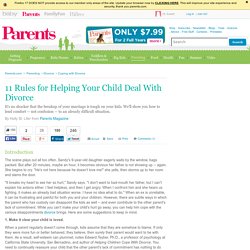
Sandy's 9-year-old daughter eagerly waits by the window, bags packed. But after 20 minutes, maybe an hour, it becomes obvious her father is not showing up -- again. She begins to cry. "He's not here because he doesn't love me! " "It breaks my heart to see her so hurt," Sandy says. 1.
When a parent regularly doesn't come through, kids assume that they are somehow to blame. 2. If you make excuses for the other parent, it cuts off your child's chance to express himself. 3. If your ex is often a no-show, have a backup plan whenever your child is supposed to see the parent. 4. Justin Coulson, PhD sur Twitter : "Families break up... and it can be hard on everyone. How do we support young ones through such a tough time? We must stop turning children against divorced fathers.
I have been working with a Mum going through a difficult divorce who has 3 children.
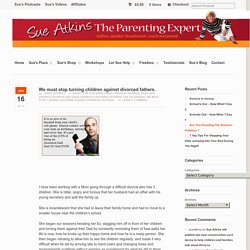
She is bitter, angry and furious that her husband had an affair with his young secretary and split the family up. She is incandescent that she had to leave their family home and had to move to a smaller house near the children’s school. She began our sessions berating her Ex, slagging him off in front of her children and turning them against their Dad by constantly reminding them of how awful her life is now, how he broke up their happy home and how he is a nasty person. She then began refusing to allow him to see the children regularly and made it very difficult when he did by arriving late to hand overs and changing times and arrangements suddenly without warning as punishment for what he did to them. In his sessions he often broke down in tears. I worked hard to help the Mum move towards putting the needs of the children first. ‘The story made headlines last October. Click on the link to read more. 10-things-children-divorce-would-never-tell-you.
Children from divorced homes go through certain struggles only they can understand.
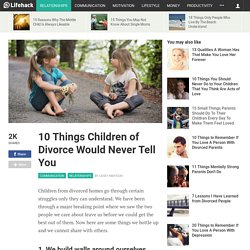
We have been through a major breaking point where we saw the two people we care about leave us before we could get the best out of them. Now here are some things we bottle up and we cannot share with others. 1. We build walls around ourselves We have been there before. 2. Perhaps this is our only security. 150603093807. Do maternal couple relationships change throughout the child-rearing years and can the likelihood of parental break-up be predicted?
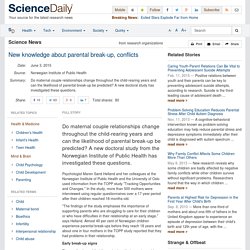
A new doctoral study from the Norwegian Institute of Public Health has investigated these questions. Psychologist Maren Sand Helland and her colleagues at the Norwegian Institute of Public Health and the University of Oslo used information from the TOPP study "Tracking Opportunities and Changes. " In the study, more than 500 mothers were interviewed using regular questionnaires over a 17-year period after their children reached 18-months-old. "The findings of the study emphasise the importance of supporting parents who are struggling to care for their children or who have difficulties in their relationship at an early stage," says Helland. Almost 40 per cent of Norwegian children experience parental break-ups before they reach 18 years and about one in four mothers in the TOPP study reported that they had problems in their relationship.
No Cookies. To use this website, cookies must be enabled in your browser. To enable cookies, follow the instructions for your browser below. Facebook App: Open links in External Browser There is a specific issue with the Facebook in-app browser intermittently making requests to websites without cookies that had previously been set. This appears to be a defect in the browser which should be addressed soon. Parenting Expert Sue Atkins releases Fink conversation cards as part of her ‘Divorce without Damage’ campaign.
Parenting Expert Sue Atkins releases Fink conversation cards as part of her ‘Divorce without Damage’ campaign DCD Publishing is delighted to announce the release of Parenting Expert Sue Atkins’ Talking to Children About Divorce Fink conversation cards in March 2015.

The complete pack contains 48 conversation starter cards to help and encourage families going through divorce to explore and express their feelings openly, in order to reduce the negative impact of parental break-ups on children. Written by Sue, the Fink cards are aimed at use by parents, teachers and child-care professionals and are part of a wider Divorce without Damage campaign launched by Sue to help parents and families going through a difficult time by focusing on keeping the communication channels open. Other products in the range include CDs, podcasts and workshops. The cards give parents clarity, direction and confidence around the emotional and practical aspects of managing their divorce. Child Psych Central. No Cookies. Sue Atkins sur Twitter : "here are my new #divorce conversational cards for #children #parents #teachers #counsellors. Talking To Children About Divorce – Positive Conversations.
Positive Conversations About Divorce Launching on the 17th March, Talking to Children About Divorce is now available to Pre Order.
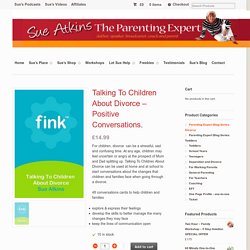
For children, divorce can be a stressful, sad and confusing time. At any age, children may feel uncertain or angry at the prospect of Mum and Dad splitting up. Talking To Children About Divorce can be used at home and at school to start conversations about the changes that children and families face when going through a divorce. 48 conversations cards to help children and families explore & express their feelingsdevelop the skills to better manage the many changes they may facekeep the lines of communication open These cards can help give parents clarity, direction and confidence around the emotional and practical aspects of managing their divorce Written by Sue Atkins, an internationally recognised Parenting Expert, Broadcaster, Speaker and Mum.
Be the first to get your hands on this great resource by pre ordering your copy today. Sue Atkins will publish two new conversation card decks to help children and families talk about Divorce. I’m delighted to be working with Lisa Warner of Finkcards to create what I feel to be an incredibly important set of conversational cards around supporting children and families going through a divorce.

Here’s our press release: “Sue Atkins, an internationally recognised Parenting Expert, Broadcaster, Speaker & Author, will write a series of Fink Cards that can be used by parents, childminders, teachers and counsellors to keep the lines of communication open and help children to explore and express their feelings openly when their parents are going through a divorce.
I am delighted to be working with Sue to bring her unique insights into helping children and families cope with Divorce! Sue says “For children, divorce can be a stressful, sad and confusing time. To find out more about Sue, you can visit her author profile or alternatively visit her site www.theSueAtkins.com www.finkcards.co.uk. 10 Unexpected Silver Linings Of Divorce The 'Uncle Dad Syndrome': When Divorced Dads Act Like Carefree Uncles and Why Their Kids Feel Cheated Some people call them "Disneyland Dads.

" I call them "Uncle Dads" -- divorced dads who parent the way you'd expect bachelor Uncle Bob to act when he watches your kids for the weekend. The "Uncle Dad Syndrome" is not just about indulging the kids. It's the entire personality of this dad and how he parents. While many dads successfully share custody and are tuned into their children's lives and needs, the Uncle Dad has difficulty doing this. The classic Uncle Dad often shows up late to start his 2, 3 or 4-day custody stretch because he was "tied up at work" or "at the obligatory happy hour.
" The main characteristic of the Uncle Dad is he's preoccupied with his own needs and desires -- an unconscious self-absorption. But once the fun is over, he detaches and the kids are left to their own devices. Kids do have a good time with their Uncle Dad, particularly when younger. "Let the kids be kids," say these dads. Sue Atkins Parenting Expert. We are Not Meant To Do It All By Ourselves Going through a divorce is painful, frightening and emotionally exhausting and making meaningful changes in our lives can be tough when we try to do it all by ourselves.
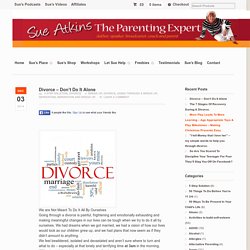
We had dreams when we got married, we had a vision of how our lives would look as our children grew up, and we had plans that now seem as if they didn’t amount to anything. We feel bewildered, isolated and devastated and aren’t sure where to turn and what to do – especially at that lonely and terrifying time at 3am in the morning. Without consistent, independent and professional support even our best intentions get overtaken by the stress and circumstances of our daily lives during a break up. We all seem to be rather blind and resistant to the changes forced upon us, yet we seem to dread asking for any help or advice. Yet you are not alone and you are not a failure. DON’T STEW – ASK SUE. Divorce. The Critical Question To Ask Yourself.
14 men open up about the devastation of divorce. Divorce from a men’s perspective.

Source: News Corp Australia THERE is a common misconception that women are more heartbroken after divorce than men are — picture the cliche divorcee trying to put her life back together after being left. Share links and collect opinions. Is Making A Bucket List the Cure to Post-Breakup Depression? Mother nature is a man and other observations.. PositivFamilies : If kids could make the rules... Australian Divorce Blog: A Christmas survival guide- by a divorce lawyer. Christmas is the best of times and the worst of times. For most of us, Christmas is the best of times- the time that we can spend with friends and family with joy.
For some of us, Christmas is an agonising period when relationships end, and there is no contact with children or close family: a recipe for loneliness. Christmases spent that way are tough. For family lawyers, Christmas often brings in many new clients who have split up over Christmas, or who argue about Christmas. Here’s how to survive the agonies of Christmas: Don’t blow the credit card. Co-Parenting: Signs That You Are on a Collision-Course. At best, co-parenting is an ideal. The notion that you can jointly make decisions regarding your children with a former spouse, who you divorced for a reason, is unrealistic for most. For a minority, this utopia of parenting is achieved because of shared ideals, generally similar values and an ability to set aside differences in the best interests of the children. For most, however, it is an untenable situation fraught with pitfalls and landmines plaguing your relationships for at least the next 18 years ... but more often, for a lifetime.
It goes without saying that we all want what's best for our children. Unfortunately, trouble arises when what's best for our children has multiple meanings. What are some of the tell-tale signs that co-parenting is on a collision-course destined for courtroom drama? When faced with co-parenting issues, consider the following: 1. I believe it's safe to say that most parents want what's best for their child. How to help an angry sister post-divorce taking it out on her kids. Q My sister, 45, has three daughters — 17, 16 and 6 — a sharp tongue and an ex-husband who has remarried and started a new family. He is barely involved with his girls, although he does send a child support check to my sister every month. ¶ The children’s basic needs are met and there is no physical or substance abuse in the home, but these girls have lived on the edge of an active volcano ever since their parents divorced five years ago. My sister’s temper has gone from sharp to nuclear.
A happy divorce: Why breaking up needn’t be so hard to do. Parental Divorce Negatively Affects Later Parent/Child Relationships. When children experience parental divorce, they are more likely to have insecure relationships with their parents once they grow into adults. A new 2013 study, published in Personality and Social Psychology Bulletin, reports that insecure parental relationships were most pronounced when the divorce occurred during early childhood. This is the first such study to determine that the timing of the divorce in the first years of life has a greater impact. It is also one of the first to demonstrate a link between the divorce and the parent/child relationship being harmed. The Best Way Out Is Always Through. How children can benefit from involvement in divorce mediations. 7 Tips to Avoiding a Disastrous Divorce. Litigants, fueled by emotions, jealously or bad advice, can easily snatch defeat from the jaws of victory by making poor decisions during their divorces.
All your planning, strategizing and preparation will be for naught if you make one of these predictable, but easily avoidable mistakes. Since a litigated divorce is mentally overwhelming, you could unwittingly fall victim to these behaviors, which would ensure that you would only view your divorce with regrets. By simply being aware of what not to do, you can steer clear of these mistakes. 1. Hiring the wrong attorney. Hiring the bullldog attorney -- the super aggressive lawyer who promises to leave no stone unturned so that you will "win" the case and punish your spouse -- is a recipe for disaster. The only person who will definitely benefit from this hire is the attorney. On the other hand, you do not want to retain the overly conciliatory attorney either. So your kid wants to live with your ex. Here's what not to do. A column that tackles behavioural problems from toddlers to teens The problem. Back to School: Learning to Share Is Not Just for Kids. Mother nature is a man and other observations..
I have decided that it is much better to live a life of uncertain happiness than a life of certain misery. Iyanla's Co-Parenting Guidelines for Sheree and Bob Whitfield - Video - @OWNTV #IyanlaFixMyLife. Divorce_Care : You have the great potential...